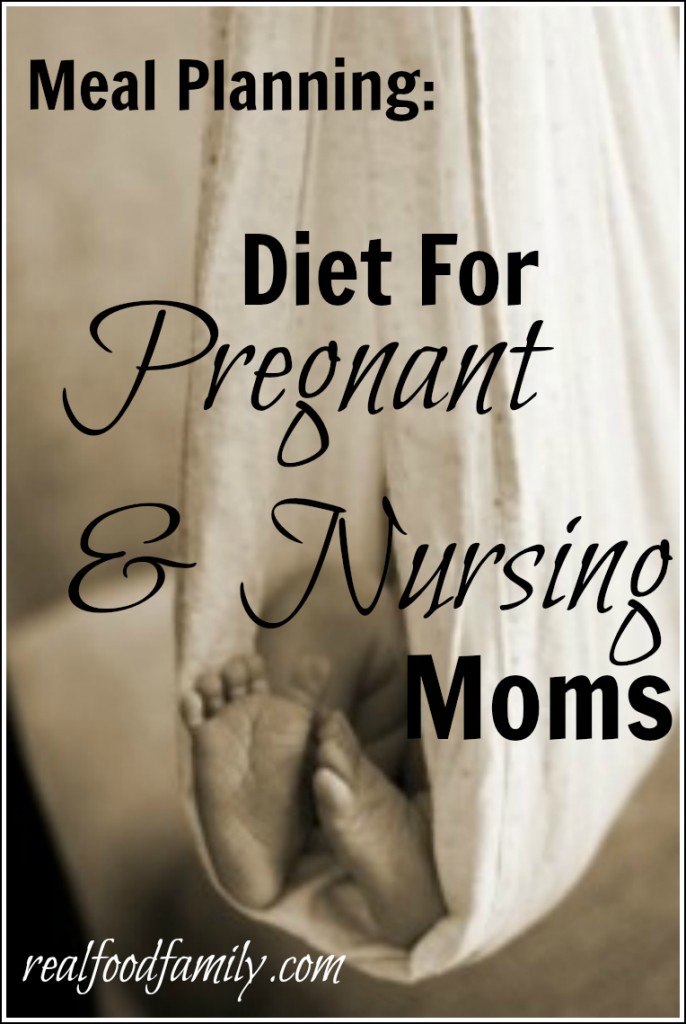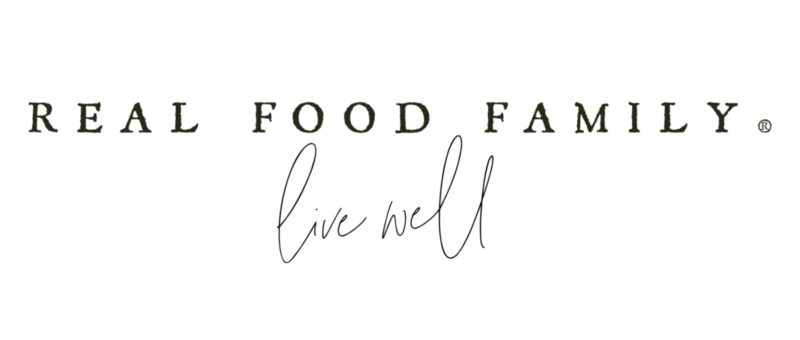Need to eat right during pregnancy and lactation? Let’s begin by diving into the following recommendations for Pregnant and Nursing moms from the Weston A. Price Foundation (www.westonaprice.org).
Diet for Pregnant and Nursing Mothers
- Cod Liver Oil to supply 20,000 IU vitamin A and 2000 IU vitamin D per day
- 1 quart (or 32 ounces) whole milk daily, preferably raw (www.realmilk.com)
- 4 tablespoons butter daily, preferably from pasture-fed cows
- 2 or more eggs daily, preferably from pastured chickens
- Additional egg yolks daily, added to smoothies, salad dressings, scrambled eggs, etc.
- 3-4 ounces fresh liver, once or twice per week (If you have been told to avoid liver for fear of getting “too much Vitamin A,” be sure to read Vitamin A Saga from www.westonaprice.org)
- Fresh seafood, 2-4 times per week, particularly wild salmon, shellfish and fish eggs
- Fresh beef or lamb daily, always consumed with the fat
- Oily fish or organic lard daily, for vitamin D
- 2 tablespoons coconut oil daily, used in cooking or smoothies, etc.
- Lacto-fermented condiments and beverages
- Bone broths used in soups, stews and sauces
- Soaked whole grains
- Fresh vegetables and fruits
Top Recommended Supplements:
- Extra Virgin Cod Liver Oil
- doTERRA Vitamin List (instead of the multi or prentatal)
- Glandular Supplements- raw, desiccated liver
- B12/Folate lozenge supplement (lozenges are best for absorption)
- Top Quality Probiotic Supplement
- Juice Plus+ whole vegetable and fruit supplements
*Learn more about supplements and other recommendations for pregnancy health here.
AVOID:
- Trans fatty acids (hydrogenated and partially-hydrogenated oils)
- Junk foods
- Commercial fried foods
- Sugar
- White flour
- Soft drinks
- Caffeine
- Alcohol
- Cigarettes
- Drugs (even prescription drugs)
Although I would love to go into the science and reasoning behind all of these recommendations, this is not what this article is about. You’ll just have to trust your NTP, or look up more information through the Weston Price Foundation website, www.westonaprice.org. Know that these guidelines will promote optimum fetal development, emphasizing skeletal structure, immunity, neurological function, coordination, behavior, and more.
I simply want to outline an example of a weekly diet and supplement routine that would fulfill these recommendations. Many times my clients receiving this information are overwhelmed and do not understand how these recommendations can be applied to a “normal” life. Hopefully this information will help.
Note about pre-conception and pregnancy education:
Try to prepare for a pregnancy at least six months before conceiving to ensure the strongest, healthiest pregnancy and fetal development possible. This is a traditional and cultural practice that has been lost in Western culture. Such preparations include:
- Follow the diet for pregnancy and lactation mentioned above.
- Learn how to track menstrual cycles to understand when you are and are not fertile. This will help a woman having trouble with fertility and help ensure proper times to try to conceive. I used this book to learn about tracking fertility successfully and this workbook to keep track of it all.
- These books are probably my absolute favorites for preparing for healthy babies…Beautiful Babies by Kristen Michaelis and The Nourishing Traditions Book of Baby and Child Care by Sally Fallon Morell.
- Work on your health before or during pregnancy and lactation with a Nutritional Therapy Practitioner to discover deficiencies or any special health needs you may have and need to address for optimal health.
- For all my recommendations during conception, pregnancy and lactation, be sure to read and bookmark this post I wrote: Everything I Would Tell My Best Friend About Pregnancy.
Now for the Meal Planning…
All recipes in quotations are from my cookbook,
Real Food Family’s Complete Guide to Optimum Health: A Meal Planning Cookbook.
I also recommend becoming a member of my meal plans library: Real Food Weekly, weekly recipes and shopping lists.
Daily Breakfast:
- “Eggs and Bacon Breakfast,” “Omelet Breakfast,” “Leftovers Frittata,” “Sunny Salmon Eggs,” or any breakfast including 2 eggs, softly cooked.
- Every few days, consider a small serving of organic rolled oats, soaked overnight in water and a little whey (made from raw milk, if possible), and heated; serve with raw cream, butter, extra virgin coconut oil, “Crispy Nuts,” dried organic fruits, and other desired toppings. Try this recipe for Soaked Oatmeal Custard.
- 8 oz raw milk
- Supplements- Fermented Cod Liver Oil/High Vitamin Butter Oil Blend and other raw liver supplements
Mid-Morning Snack:
- “Smoothies” made with 8 oz raw milk and/or kefir, 2 raw egg yolks, with added extra virgin coconut oil (may be used as a mid-morning or mid-afternoon snack). Additional options could include organic frozen organic fruits and organic spinach.
Lunch:
*Eat a fatty fish like salmon or anchovies blended in salad dressing for lunch on days where organic bacon is not consumed for breakfast.
- Mixed salads with leftovers or cooked (fatty pieces of) beef, lamb, shrimp, or salmon, topped with homemade dressing made with virgin coconut oil. Add anchovies or sardines to salad dressings.
- Kombucha Tea (homemade or available in health food stores)
*Add lacto-fermented vegetables to salads, if possible.
Afternoon Snacks:
- “Homemade Chicken and Vegetable Soup”
*Make this basic soup weekly and add 3-4 oz of grass-fed, organic beef liver to the broth. Do your best to grind the cooked liver up and keep as much in the soup as possible.
- Fresh organic fruits and vegetables, “Crispy Nuts,” lacto-fermented condiments and beverages, and other nourishing snack options from my cookbook or Sally Fallon Morell’s “Nourishing Traditions” cookbook.
Dinner:
- Choose a protein, such as beef, lamb chicken or seafood and pair with at least 2 vegetables and butter or coconut oil. For delicious recipes and dinner meal plans, follow the weekly dinner plans in my Meal Planning cookbook or weekly meal plans library: Real Food Weekly! (All dinner recipes include a proper balance of quality whole food sources of fat, protein, and carbohydrate. Generally meals include a quality meat with 1-2 vegetables, served with butter.)
- 16 oz raw milk
*Use organic lard as a cooking fat option for dinner recipes for the Vitamin D!
*If possible, substitute one or two weekly meat options with organic beef liver. Sally Fallon has good organ meat recipes in Nourishing Traditions.
If you need more recipe ideas, here is a list of all my recipes meant for pregnant and nursing moms.
I will be the first to admit that liver was the hardest thing to add to my pregnancy and lactation diet. It is a good idea to try working on acquiring a taste for liver before having to battle a finicky pregnancy appetite. If you happen to enjoy eating liver, by all means EAT IT! Of course, you can’t eat just any beef liver. Since the liver is a filtration and detoxifying organ, a toxic animal will not have organs safe for eating. This is why Americans think organ meats are so dangerous. When from a healthy, grass-fed cow, beef liver is one of the most nutrient-dense foods available, surpassing vegetables and fruits by far. If eating liver is out of the question, take this capsule form instead.
Happy Pushing!
*A note about fish: As wonderful as fish is nutritionally, we unfortunately have to worry about fish contaminated with heavy metals. Farmed fish are nutritionally as bad as commercially produced beef, so I do not consider that an option either. Go to this page to learn everything you need to know about fish to eat happily, and those to avoid.


